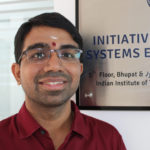
Manikandan Narayanan
Associate Professor, Dept. of Computer Science & Engineering
Indian Institute of Technology Madras

Manikandan Narayanan enjoys research at the interface between computer science and systems biology in his current position as an Associate Professor at the Indian Institute of Technology Madras. He is fascinated with using the power of computation and network/data-driven science to tease apart the molecular interactions underlying life, and his research focuses specifically on (multilayer) graph algorithms and probabilistic models to discover novel tissue-tissue communication or disease-disease interaction routes from high-dimensional genomic data. He obtained his PhD in Computer Science (with an emphasis in computational and genomic biology) from the University of California at Berkeley, and held a Sr. Research Scientist position at Merck Research Labs before joining National Institutes of Health (NIH) as a Staff Scientist. He is a Siebel Scholar Class of 2003, and a Wellcome Trust/DBT India Alliance Intermediate Fellow starting 2017. He is excited about potential collaborations with other researchers with mutual interests in the RTG Big Data Research Program.
Principal Investigator
Further information
Projects within the RTG Big Data / Supervised students within the RTG Big Data
Any project involving large-scale gene expression data (multi-tissue, single-cell, multi-disease) analysis to infer novel tissue-tissue communication, or disease-disease interaction routes, and integration of gene expression with other types of genomic data (on multiple tissues/diseases from matched individuals).
Research interests of relevance to the project
- Genomic/biological data analysis (to infer novel tissue-tissue communication and disease-disease interaction routes)
- Gene expression data analysis (mult-tissue data, multi-disease data, single-cell data)
- (Multilayer/Multi-tissue) gene networks
Field of Expertise
- Computational Biology
- Bioinformatics
- Genomic data analysis
- (Multilayer/Multi-tissue) Gene networks
- Systems biology (of tissue-tissue communication, and disease-disease interactions)
Selected publications
- Effect of Interlayer Coupling on Multilayer Network Centrality Measures (review article). T Kumar, M Narayanan, B Ravindran. To appear in Journal of the Indian Institute of Science 99 (2). 2019.
- Environment tunes propagation of cell-to-cell variation in the human macrophage gene network. AJ Martins*, M Narayanan*, T Prüstel, B Fixsen, K Park, RA Gottschalk, Y Lu, C Pfannkoch, WW Lau, KV Wendelsdorf, JS Tsang. (*equal contributions). Cell Systems 4 (4), 379-392.e12. 2017 (highlighted in a Spotlight article)
- Robust inference of cell-to-cell expression variations from single- and k-cell profiling. M Narayanan, AJ Martins, JS Tsang
PLoS Computational Biology 12 (7), e1005016. 2016. - Common dysregulation network in the human prefrontal cortex underlies two neurodegenerative diseases. M Narayanan+, JL Huynh, K Wang, X Yang, S Yoo, J McElwee, B Zhang, C Zhang, J Lamb, T Xie, C Suver, C Molony, S Melquist, A Johnson, G Fan, D Stone, E Schadt, P Casaccia, V Emilsson, and J Zhu+ (+joint corresponding authors). Molecular Systems Biology 10 (7), 743. 2014.
- Global analyses of human immune variation reveal baseline predictors of postvaccination responses. JS Tsang+, PL Schwartzberg+, Y Kotliarov#, A Biancotto#, Z Xie#, RN Germain#, E Wang#, M Olnes#, M Narayanan*, H Golding*, S Moir*, H Dickler*, S Perl*, F Cheung*, Baylor HIPC Center, and CHI Consortium (+corresponding authors. #equal contributions. *equal contributions)
Cell 157 (2), 499-513. 2014. (selected as one of the notable NIAID Research Advances of 2014)
Contact details
Address:
BSB 346
Dept. of Computer Science & Engineering
Phone: +91 442 257 4375


